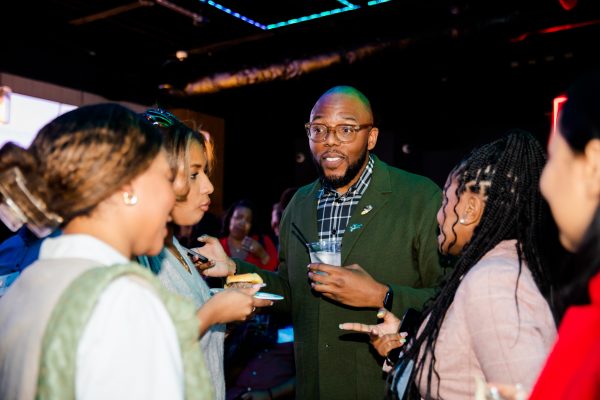By Jenna Somers
A new research collaboration focused on generating and sharing evidence-based Black education solutions has launched under the leadership of Vanderbilt Professor Chezare Warren. According to its mission statement, The Possibilities Project “is an arts-informed knowledge hub committed to improving Black students’ well-being in education and beyond.” The collaborative will serve as both a research laboratory and a convener of scholars, practitioners, and policymakers committed to advancing Black education solutions related to, and building from, Black children’s possibility.
“We are a collaborative whose mission is guided by the question, ‘What does it mean for Black children’s possibility, rather than their problems, to anchor efforts aimed at transforming their education experience?’” said Warren, associate professor of leadership policy, and organizations at Vanderbilt’s Peabody College of education and human development. “I’m very much interested in understanding how the concept of possibility is an essential philosophical intervention to guide our efforts to transform Black educational outcomes. I also wanted to create a space and infrastructure to think about possibility in innovative ways—to leverage art as a medium for knowledge dissemination, and in doing this work, steadily draw inspiration from the philosophies and orientations of activists in the Black radical tradition.”

The Possibilities Project held a soft launch event at the American Educational Research Association’s annual meeting in April, attended by more than 75 scholars, education practitioners, civic leaders, and policy advocates. The recently launched website updates interested stakeholders about the collaborative’s scholarship and initiatives, as well as amplifies the work of colleagues deeply engaged in projects that are informed by Black children’s possibility. Carla P. Wellborn and De’Ja Wood, doctoral students in the Department of Leadership, Policy, and Organizations and research assistants with The Possibilities Project, work with Warren to conduct research, elevate the collaborative’s programming, and build relationships with potential collaborators.
The Possibilities Project’s inaugural study, “Examining Anti-Racist Restorative Justice as a Site for Black Educational Transformation: A Possibilities Project Case Study,” is supported by a $150,000 grant from the New Venture Fund. Led by Warren, the study will examine how high school-aged Black students experience implementation of a new antiracist restorative justice approach to school discipline—a model intended to replace exclusionary discipline practices that often negatively affect Black children and undermine their educational well-being. The study will build understanding of what happens when schools make structural changes to undo Black youths’ suffering in school, and in this particular case study, the effects of such changes on educators’ orientation to school discipline with Black students. This project exemplifies the types of empirical studies best aligned to the collaborative’s research agenda, which Warren hopes will spotlight the importance of possibility for advancing Black educational transformation.
Ideas and reflections from his latest book motivated Warren to create the new collaborative. In Centering Possibility in Black Education, Warren “describes practical, antideficit approaches to educating Black children, youth, and young adults.” He was inspired to write the book after reading Freedom Dreams by Robin D.G. Kelley, which catalogues the history and philosophies of artists and intellectuals of the twentieth century African diaspora and Black radical tradition. Warren wrote much of the book in 2020, during the Black Lives Matter protests at the height of COVID-19 pandemic—which greatly affected Black communities and the education of Black children. This period was difficult for Warren, as he writes in the book’s preface, “With every word, every paragraph, every page, and every essay or chapter written in Centering Possibility, I was learning to breathe again…I wrote the book I needed to read in 2020.”
“Afro Artivism: An Evening of Art & Hiphop,” is another example of possible work by the collaborative. This event was funded last year by an Office of the Provost’s inaugural Arts, Discovery, and Innovation grant to support faculty and staff research collaborations with the National Museum of African American Music. Warren collaborated with colleagues at the Student Center for Social Justice and Identity; the Bishop Joseph Johnson Black Cultural Center; the Office of Equity, Diversity, and Inclusion; and the Blair School of Music.
“These are the types of collaborations and projects this arts-informed knowledge hub aspires to engage with, elevate, and amplify,” Warren said. “We want to strengthen Black students’ well-being in education through a focus on their possibility, and that takes all of us—scholars, educators, and policy advocates alike—coming together across many different types of space to discover solutions and put them into practice.”
Follow The Possibilities Project on Instagram and Twitter @tppcollab and visit the website to stay connected.